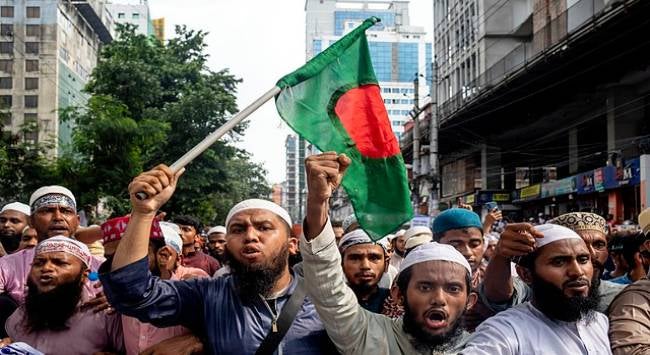Summary
In Bangladesh, blasphemy has been a contentious and sensitive topic, garnering considerable international attention over past decades. Individuals continue to be persecuted for blasphemy under various legal provisions regarding religion in Bangladesh to the dismay of human rights groups.
Blasphemy has been a contentious and sensitive topic in Bangladesh – one that has attracted significant attention globally over past decades. Muslims constitute approximately 80 per cent of Bangladesh’s population, with Hindus, Buddhists and Christians being the religious minority. Bangladesh has enacted several laws that govern the public discussion of religion, specifically Islam, and also regulates acts deemed offensive towards religious beliefs.
Based on a 2019 analysis conducted by the Pew Research Center, around 79 countries and territories, which accounted for approximately 40 per cent of the 198 countries and territories studied, were found to have implemented laws or policies that specifically banned blasphemy. In Bangladesh, Sections 295 to 298 of the Penal Code serve a similar purpose to a blasphemy law by addressing and prosecuting alleged instances of religious criticism and offences. Section 295A of Bangladesh’s Penal Code specifically targets deliberate and malicious acts intended to outrage the religious feelings of any class. Violations of this law can result in imprisonment and or fines. This law covers insults by words, either spoken or written, visible representations of insults, or attempts to insult religion or religious beliefs.
In the past, the Jamaat-e-Islami, an influential Islamist political party in the country, made efforts to introduce a law similar to Pakistan’s Section 295C in the Pakistan Penal Code, which would mete out the death penalty for blasphemy. However, Bangladesh’s Prime Minister Sheikh Hasina firmly rejected such calls, stating, “We don’t have any plan to [bring in the law]. We don’t need it. They should know that existing laws are enough”. She continues to emphasise that Bangladesh is a secular democracy. Nonetheless, Hasina has maintained her support for the laws against religious offences as they currently stand.
Bangladesh’s 2018 Digital Security Act (DSA), which came into force on 1 October 2018, further extends the control to technology, particularly social media, electronic media and print media. According to the Act, individuals can be sentenced to life imprisonment for “propaganda” against the nation and face up to 10 years in jail for digital content that is deemed to “offend religious sentiments” or “cause social unrest”. This law has been severely criticised by international organisations for infringing on freedom of expression, breaches of international human rights laws and contributing to the increasing state control of cyberspace in the nation.
Proponents of Sections 295 to 298 and the DSA have claimed that these are necessary to protect religious sentiments and maintain social harmony. However, critics say these laws against alleged religious offences have been utilised to an extreme degree to target religious minorities and those with differing opinions. To cite one example of many, in 2020, Bangladeshi Sufi folk singer, Shariat Sarker, was arrested under the DSA for “hurting the religious sentiment of Muslims”. Sarker claimed that the Quran did not prohibit the practice of music and criticised the use of religion as a political tool. The alleged anti-Islam comment led to hundreds to protest on the streets and demands for his arrest.
While Article 39 of the Bangladeshi Constitution guarantees the freedom of thought and conscience, and Article 41 specifically protects freedom of religion, there has been a rise in religious extremism and the increased usage of controversial laws by the authorities to silence criticisms. Numerous bloggers and journalists have been persecuted under such laws. After enduring attacks, including fatal incidents, by Islamic extremists between 2013 and 2018, a number of atheist bloggers chose to leave Bangladesh. While some continue to maintain their blogs from foreign locations, they express concerns about the possibility of arrest or retaliation from Islamic fundamentalists should they decide to return home.
Apart from state and legal persecution, public outrage and mob lynching regarding such instances have caused many deaths. In 2020, hundreds beat and lynched a man for allegedly desecrating the Quran. In 2019, according to the human rights organisation, Ain O Salish Kendra, 65 people were killed by mobs. Between 2012 and 2020, 625 people were estimated to be victims of mob lynching.
The propensity for violence and growing instability associated with blasphemy and religious intolerance continue to be detrimental to social harmony, religious freedoms and freedom of expression in Bangladeshi society.
. . . . .
Ms Isha Gupta is a research intern at the Institute of South Asian Studies (ISAS), an autonomous research institute in the National University of Singapore (NUS). She can be contacted at isav17@partner.nus.edu.sg. Dr Imran Ahmed is a Research Fellow at the same institute. He can be contacted at iahmed@nus.edu.sg. The authors bear full responsibility for the facts cited and opinions expressed in this paper.
-
 More From :
More From :
-
 Tags :
Tags :
-
 Download PDF
Download PDF



